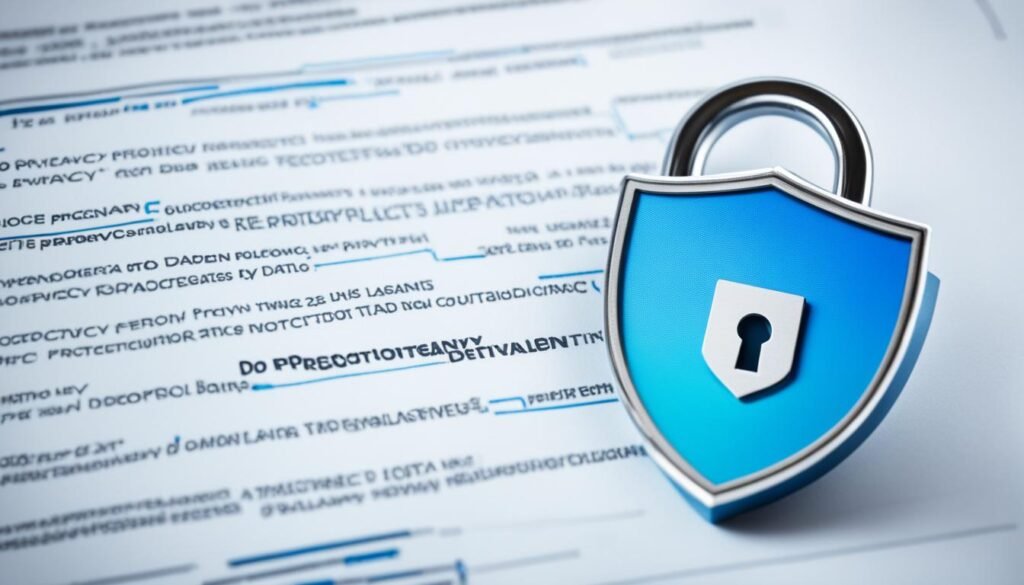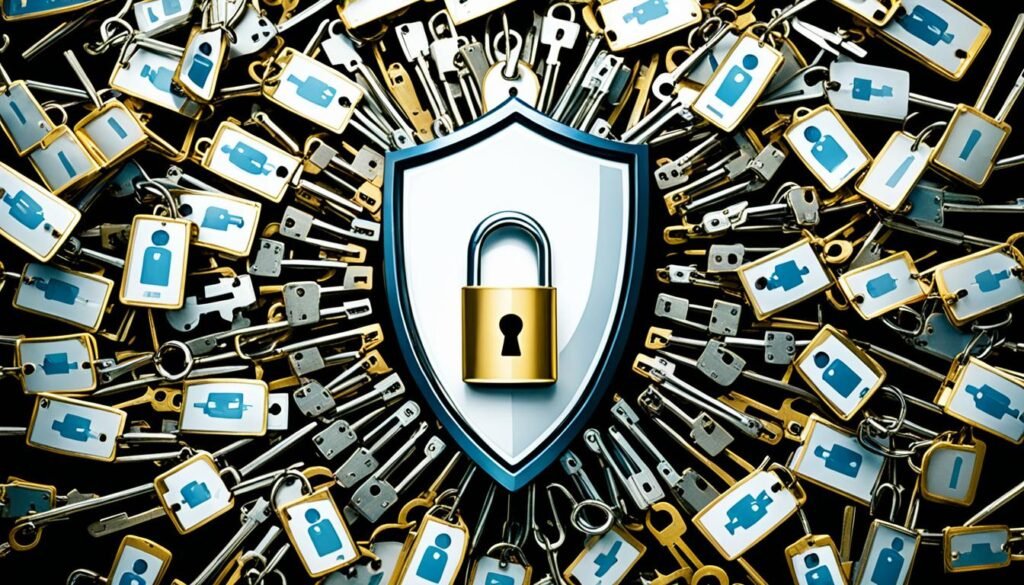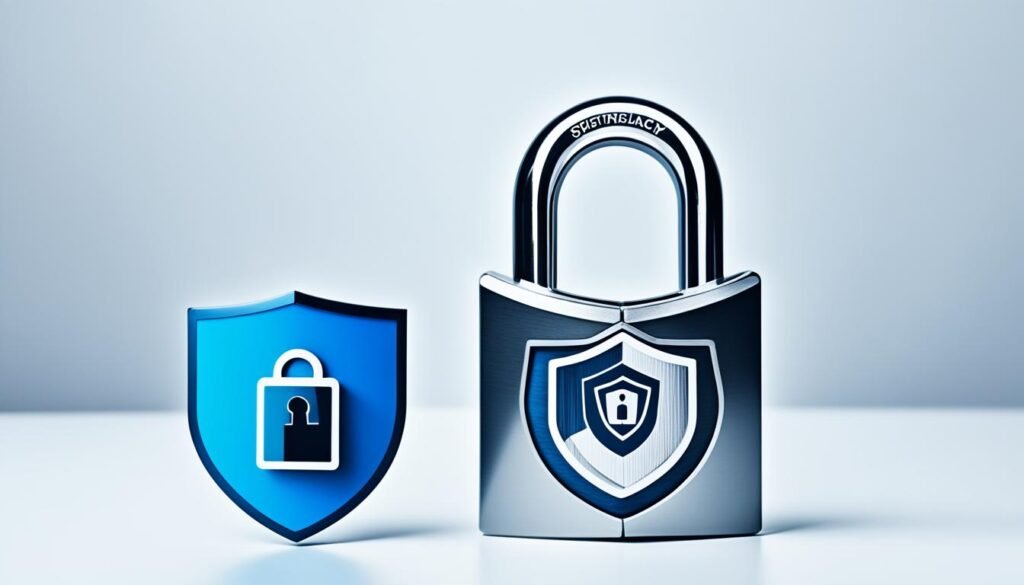Data powers many businesses today. It helps create personalized customer experiences and drives insights. Legislators work hard to protect people’s privacy and safety, controlling how companies use data.
Data privacy is key for keeping personal information safe. It builds trust in our digital world and protects our rights. Yet, businesses find it hard to follow rules like the GDPR and CCPA, which ensure data is kept safe.
Key Takeaways
- Data privacy is essential for protecting personal information and upholding individual rights in the digital age.
- Effective data privacy practices build trust between businesses and their customers.
- Compliance with data privacy regulations like GDPR and CCPA is crucial for businesses.
- Safeguarding data privacy requires a comprehensive approach, including secure data handling and transparent data policies.
- Addressing data privacy challenges is a key priority for businesses in the modern, data-driven economy.
Understanding Data Privacy
Data privacy means more than just protecting personal data like your name or where you live. It’s about keeping all sensitive data safe, including things like business secrets. This stops others from using your info without permission.
What is Data Privacy?
Essentially, data privacy is carefully managing any private or sensitive data. This could be your social security number, bank account details, or health information. It gives people control over their info and makes sure companies use it right and safely.
Importance of Data Privacy
Data privacy is very important. It helps organizations earn trust with their clients, follow the law, and set good ethical standards for using data. It protects personal info, spurs new ideas, and keeps personal freedoms strong in our connected world.
For companies, good data privacy keeps them from bad press, legal troubles, and losing customer trust. By valuing data privacy, firms show they are reliable and care about using data safely.
“In the digital age, data privacy has become a fundamental human right. Organizations must prioritize the responsible and ethical management of personal information to maintain the trust of their customers and stakeholders.”
Protecting Personal Information

Today, keeping personal data safe is very important. Details like your money information or health data, if in the wrong hands, can lead to serious issues. Laws like the General Data Protection Regulation (GDPR) and the California Consumer Privacy Act (CCPA) are there to help. They guide how personal info is collected and shared, and push companies to keep it secure.
To protect your data, companies use many methods. They keep data in safe places, use strong codes to hide it, and have rules on how to use this info. They should also tell you clearly how they’ll use your personal info. This helps you choose how to keep your identity and data safe.
Focusing on data privacy helps businesses win trust from their customers. It makes them look good and avoids problems like data leaks or fines. A solid plan for protecting personal data makes people feel safer and more willing to share their information. This benefits everyone, from companies to consumers.
| Data Privacy Principles | Description |
|---|---|
| Transparency | Organizations must be clear and upfront about their data collection and usage practices. |
| Consent | Individuals should have control over the personal information they choose to share. |
| Purpose Limitation | Personal data should only be collected and used for legitimate, specified purposes. |
| Data Minimization | Organizations should collect and retain only the minimum amount of personal data necessary. |
| Security | Appropriate technical and organizational measures must be taken to protect personal data. |
“Protecting personal information is not just a legal requirement, but a moral obligation. Organizations that prioritize data privacy and security are not only safeguarding their customers, but also building trust and reputation.” – Privacy Expert
Building Trust and Reputation

In today’s world, personal data is constantly collected, stored, and shared. So, it’s critical for businesses to earn and keep customer trust. They can do this by valuing data privacy. When companies show they care about protecting customer info, they gain a reputation as reliable. This builds lasting trust and loyalty.
Maintaining Customer Confidence
Keeping data private is both a rule and the right thing to do. Companies must follow ethical data practices. This means getting permission before collecting, using, and sharing data. Doing so shows they respect people’s rights and are open about their actions. It helps build trust that data is in good hands.
Explaining clearly how they use data and letting customers control their own info makes businesses trustworthy. This makes customers feel secure, leading to a better data privacy reputation. It also boosts loyalty and improves the way the public sees the company.
Ethical Data Practices
- Obtain explicit consent for data collection, usage, and sharing
- Implement robust security measures to protect customer data
- Regularly review and update data privacy policies to ensure compliance
- Provide clear and easily accessible information about data handling practices
- Respond promptly and transparently to customer inquiries and concerns
Keeping customer trust and using ethical data practices are vital for a safe and responsible data world. By focusing on data privacy, businesses not only safeguard their customers. They also boost their own customer trust and data privacy reputation. This helps make them leaders in handling data the right way.
“In a world of increasing data breaches and privacy concerns, building a reputation for data privacy and ethical data practices is essential for long-term business success.”
Data Privacy Laws and Regulations

Many countries have set up data privacy laws to protect personal information. These rules control how companies around the world gather, use, and share data. The European Union’s General Data Protection Regulation (GDPR) and the United States’ California Consumer Privacy Act (CCPA) are two key examples.
General Data Protection Regulation (GDPR)
The GDPR is focused on managing personal data in the European Union. It lets EU citizens have more say over their personal info. This law makes sure businesses protect this data and follow strict rules. If companies don’t follow the GDPR, they can face big fines. This pushes firms to make data privacy a top concern.
California Consumer Privacy Act (CCPA)
Since 2018, the CCPA has been helping citizens in California control their personal info. It makes companies share how they collect data clearly. It also lets people see or delete their data, and stop companies from selling it. With more U.S. states introducing laws like the CCPA, individuals across the country have more power over their data privacy.
Such laws exist to protect people’s rights and encourage safe data use. They make sure companies handle personal details carefully and with respect.
“The right to privacy is a fundamental human right, and the protection of personal data is essential to maintaining our dignity and autonomy.”
Data Privacy Principles

The Organization for Economic Cooperation and Development (OECD) set out fair information practice principles. These ensure personal data is handled with care. They are key in data privacy, seen in laws like the GDPR and CCPA.
The OECD highlights several important data privacy principles:
- Collection Limitation: Collect personal data fairly, with limits, and with consent where right.
- Data Quality: Personal data must be accurate, relevant, and always up-to-date for its use.
- Purpose Specification: Be clear on why data is collected. Later use should still fit the main purposes stated.
- Use Limitation: Don’t misuse personal data. Only use it for the clear, stated purposes unless the law allows otherwise.
- Security Safeguards: Protect personal data from being lost, accessed without authority, damaged, or misused.
- Openness: Be open about your data practices. Let people know what data is used for and how.
- Individual Participation: Let people access and correct their personal data. This upholds fair information principles.
- Accountability: Those handling personal data must follow these rules and answer for their actions.
The principles set a strong foundation for handling personal information well. They help build trust and respect people’s privacy rights.
Following these rules shows a company’s care for privacy. It encourages honest and responsible data use. In today’s digital world, privacy is a prized possession.
Data Privacy vs Data Security

Data privacy and data security are ideas often mixed up. Yet, they are different. Data privacy means handling personal info properly and ethically. It’s all about the collection and sharing of personal data.
Data security, however, aims to keep data safe from bad actors, theft, or damage. This includes using encryption and monitoring networks closely.
Understanding the Difference
Both privacy and security matter a lot. They help protect personal details and our digital world. Privacy lets people control their own data. Security keeps that data safe from harm.
For instance, a firm might secure its data really well with firewalls and encryption. But if they misuse their customers’ data, they are not respecting privacy. Likewise, a business focusing on privacy without good security could expose its customers to risks.
| Data Privacy | Data Security |
|---|---|
| Focuses on the ethical and responsible handling of personal information | Focuses on protecting data from unauthorized access, theft, or corruption |
| Covers the collection, use, storage, and sharing of data | Encompasses tools and practices like encryption, password management, and network monitoring |
| Respects the individual’s right to control their own data | Ensures the confidentiality, integrity, and availability of data |
Understanding these ideas helps firms protect data and gain their customers’ trust. In our digital world, where information is gold, safeguarding privacy is key.
“Protecting data privacy is not just a legal requirement, but an ethical obligation that businesses must prioritize to maintain trust and credibility in the digital age.”
Data Privacy

Data privacy has always been important, even before the internet age. People have always wanted to keep their personal info safe. But, the internet has made it harder to keep track of the many details we share online.
Protecting personal data is not just for businesses; it’s a crucial personal issue too. With the danger of ID theft and fraud, keeping personal info safe is vital. It’s key to keep control over your data for your own safety online.
Data privacy is crucial. It lets people decide how their personal info is used and kept safe. Today, with a bigger digital presence, data privacy challenges are more complicated. Threats like tracking and scams keep changing and growing.
“In today’s digital age, data privacy is not just a luxury, but a fundamental right that must be safeguarded.”
Keeping data private is important for personal freedom and trust online. As tech grows, we must navigate privacy challenges better. Protecting our personal info is critical.
Challenges in Data Privacy

Today, keeping our data safe online is hard. This is true for both people and groups. Social media’s privacy settings are often confusing. They make it tough to know what you’re sharing and with who. This can cause your data to be seen by the wrong eyes.
Online Tracking
Online tracking is a big issue. Many sites and apps use things like cookies and web beacons to watch what you do online. They can know a lot about you without you knowing. This info might be used to show you ads or for other uses. It’s like someone watching everything you do.
Phishing Scams
Phishing scams are a real danger. Hackers or scammers try to get your private info using fake websites or emails. They might get your passwords, bank details, or other important info. Then, they can use it in bad ways.
Also, not being able to control who sees your info is a problem. As more groups get and share our data, the chance of it being misused grows. People need to keep track and take care of their privacy.
We need to tackle these issues together. This means better privacy options, clear rules from companies, and teaching people about online safety. If we understand and protect our data, we can fight against these threats.
Tips for Protecting Personal Data

As our digital world grows, keeping our data safe is more critical than ever. With some care, we can shield ourselves from identity thieves and hackers. Here are some simple personal data protection tips to help:
- Use a locking mailbox or shred sensitive documents to stop others accessing your personal info.
- Make sure your home Wi-Fi has a strong password and uses encryption to keep your online actions private.
- Be careful giving out your Social Security number or other private details. Only share with known and trusted sources.
- Use strong, different passwords for every online account. Think about a password manager for safe keeping.
- If you can, turn on multi-factor authentication. It’s an added security layer for your accounts.
- Check and update the privacy settings on your social media to manage who sees your personal information.
These steps can help lower the chance of your data getting into the wrong hands. They give you more control over your online identity. But remember, it’s important to always keep an eye out in our digital age.
“The best way to protect your personal data is to be proactive and take steps to secure it. It’s a shared responsibility between individuals and organizations to safeguard sensitive information.”
Also Read: How Do Technology Applications Improve Business Efficiency?
Conclusion
In today’s world, data privacy is incredibly important. It protects who we are, helps us trust online, and ensures our rights. Companies and us all must protect sensitive info, following complex rules.
We need to focus on data privacy and use data ethically. This way, we can make a safe place for info, making room for new ideas while keeping our freedoms intact. Everyone plays a part in keeping data safe.
Now, more than ever, we must guard personal data. Businesses should put privacy first and keep data safe with strong methods. And individuals need to look out for their own information. Together, we can create a digital space that is safer, respects us, and welcomes new ideas.
FAQs
What is data privacy and why is it important?
Data privacy means keeping personal info safe. It covers things like social security numbers and health details. This protection stops others from using the info without permission. It’s vital for keeping personal data secure and trusting others. It also follows laws, supports good data use, allows innovation, and keeps us in control.
What is the difference between data privacy and data security?
Data privacy is about how personal info is collected and shared ethically. It includes the time and manner information is shared. Data security focuses on keeping this information from being stolen or used wrongly. It uses encryption and secure practices. Both are necessary to protect personal data and ensure a safe digital space.
What are some of the key data privacy laws and regulations?
The GDPR and CCPA are big laws on personal data in the EU and California. They lay down strict rules on how personal data is handled. If rules aren’t followed, there are heavy fines. And many U.S. states are now creating similar laws, giving people more say on their data.
What are the fair information practice principles?
These are guidelines from the OECD for how to handle personal data. They say to only collect what’s needed, ensure its quality, and use it for specific and agreed upon reasons. Also, these guidelines stress on keeping data safe, being transparent, making people aware of their data usage, letting them have a say, and taking responsibility for how data is used.
What are some common challenges in maintaining data privacy?
Social media, online tracking, and scams make data privacy hard. Settings on social sites can be complex. Cookies follow you online. Plus, phishing for info is common. All this makes it tricky to know who sees your info and to keep it safe.
What can individuals do to protect their personal data?
To safeguard data, people should use a locked mailbox and shred old documents. They should also secure their Wi-Fi and avoid sharing sensitive details. Setting strong passwords and using extra security steps helps. And, checking and updating social media privacy is a good habit.




